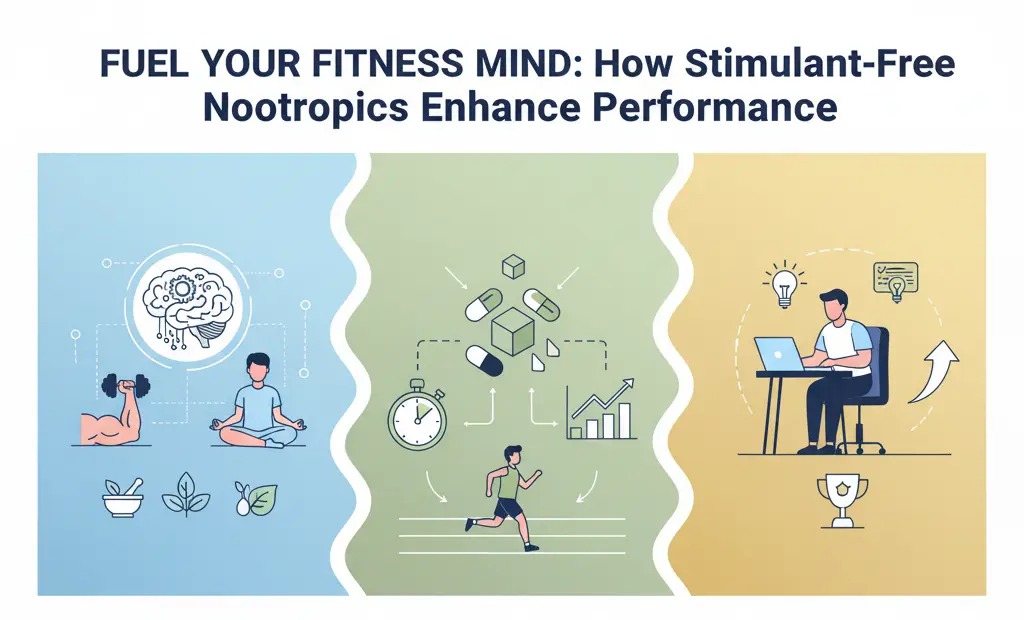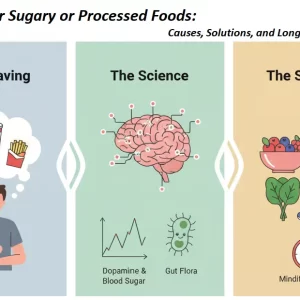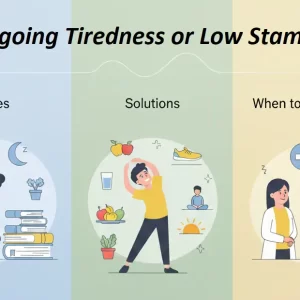Contents
- How select ingredients can elevate your mind and body
- 1. Citicoline (as Cognizin®): Boosting Focus & Recovery
- 2. L-Theanine: Calm, Clear, and Focus-Fit
- 3. Bacopa Monnieri & Rhodiola Rosea: Resilience Under Stress
- 4. Lion’s Mane & Phosphatidylserine: Neural Support for Physical Gains
- 5. N-Acetyl L-Tyrosine & Maritime Pine Bark: Performance in Focus
- 6. NutriGenesis® B-Vitamins (B6, B9, B12): Metabolic & Cognitive Support
- Mind Lab Pro®: Trusted by Athletes, Backed by Science
- Synergy in Motion: Why These Ingredients Matter for Fitness
- How to Use Smart Nootropics in Your Fitness Routine
- References
In the gym, on the track, or in the weight room, physical training is only half the equation—mental performance is the other. Imagine hitting peak focus, razor-sharp reaction times, and unwavering concentration while powering through your toughest workouts. That’s where stimulant-free nootropics come in: scientifically formulated to support brain function, enhance focus, and improve stress resilience—so your mind can keep up with your muscles.
In high-intensity training and competitive sports, cognitive sharpness matters just as much as physical ability. Whether you’re pushing through a grueling session or staying mentally focused during recovery, stimulant-free nootropics can be powerful allies.
How select ingredients can elevate your mind and body
1. Citicoline (as Cognizin®): Boosting Focus & Recovery
Citicoline supports attention, working memory, and neural energy metabolism—key for complex motor tasks and split-second decisions in sports [1]. It also regulates impulsivity and enhances cognitive control, helping athletes maintain composure under pressure [2]. Meta-analyses indicate citicoline can improve cognitive metrics in mild cognitive impairment, with moderate effect sizes [3].
2. L-Theanine: Calm, Clear, and Focus-Fit
L-Theanine promotes a relaxed alertness, increasing alpha brain waves often associated with composure and concentration [4]. Combined with caffeine, it’s been shown to enhance focus and task switching—useful for interval workouts and reacting quickly during gameplay [5]. Alone, it supports stress resilience and may even improve sleep recovery—vital for muscle repair and mental reset [6].
3. Bacopa Monnieri & Rhodiola Rosea: Resilience Under Stress
Bacopa Monnieri contributes to memory performance and stress reduction—traits beneficial for learning new movement patterns and sustaining performance under fatigue [7]. Rhodiola Rosea is an adaptogen that improves mental endurance and mitigates fatigue, helping athletes push through demanding workouts and recover faster [8].
4. Lion’s Mane & Phosphatidylserine: Neural Support for Physical Gains
Lion’s Mane Mushrooms promote nerve growth factor (NGF) and neurogenesis, which are key for motor learning and coordination development [9]. Phosphatidylserine, a critical phospholipid in neuronal membranes, supports cognitive function, reaction time, and stress response during high-intensity exertion [10].
5. N-Acetyl L-Tyrosine & Maritime Pine Bark: Performance in Focus
N-Acetyl L-Tyrosine supports dopamine synthesis during physical stress, aiding focus and mood maintenance in tough training sessions [11]. Maritime Pine Bark Extract—rich in antioxidants—improves blood flow and oxygenation, potentially supporting endurance and recovery by enhancing nutrient delivery to active tissues [12].
6. NutriGenesis® B-Vitamins (B6, B9, B12): Metabolic & Cognitive Support
These clean-cultured vitamins underpin energy metabolism, neurotransmitter synthesis, and methylation. Optimal B-vitamin status supports both mental clarity and physical normalization during training and recovery phases [13]. If you’re wondering where to buy nootropics with these ingredients, visit Mind Lab Pro.
Mind Lab Pro®: Trusted by Athletes, Backed by Science

Mind Lab Pro® is a premium nootropic supplement designed to enhance cognitive performance without stimulants. It has undergone rigorous testing in three independent, double-blind, placebo-controlled studies conducted by the University of Leeds. These studies demonstrated significant improvements in memory, focus, and decision-making.
After just 30 days of use, participants experienced up to a 47% reduction in information processing time and a 28% improvement in immediate recall. Additionally, EEG brain mapping revealed enhanced synergy between brain regions during perceptual decision-making tasks. Trusted by athletes and professionals alike, Mind Lab Pro® offers a clean, vegan-certified formulation with 11 research-backed ingredients, ensuring both safety and effectiveness.
Synergy in Motion: Why These Ingredients Matter for Fitness
Together, these compounds form a multi-dimensional strategy to enhance performance:
- Focus under fatigue (citicoline, L-theanine, tyrosine)
- Stress resilience (rhodiola, Bacopa, phosphatidylserine)
- Motor learning & coordination (Lion’s Mane, phosphatidylserine)
- Recovery support (B-vitamins, pine bark antioxidants, L-theanine)
- Neurovascular enhancement (pine bark, citicoline)
How to Use Smart Nootropics in Your Fitness Routine
- Timing: Take 30–60 minutes before workouts or practice for peak cognitive activation.
- Consistency: Benefits of Bacopa, Lion’s Mane, and citicoline build over time—daily usage yields best results.
- Hydration & sleep: Compound these supplements with proper rest and hydration for optimal results.
- Track effects: Note improvements in reaction time, stress tolerance, or coordination alongside physical metrics.
References
- Secades, J. J., & Lorenzo, J. L. (2006). Citicoline: pharmacological and clinical review, 2006 update. Methods and Findings in Experimental and Clinical Pharmacology, 28(Suppl. B), 1–56.
- Silveri, M. M., Dikan, J., Ross, A. J., Jensen, J. E., Kamiya, T., Kawada, Y., … & Renshaw, P. F. (2008). Citicoline enhances frontal lobe bioenergetics as measured by phosphorus magnetic resonance spectroscopy. NMR in Biomedicine, 21(10), 1066–1075.
- Fioravanti, M., & Yanagi, M. (2005). Cytidinediphosphocholine (CDP-choline) for cognitive and behavioural disturbances associated with chronic cerebral disorders in the elderly. Cochrane Database of Systematic Reviews, (2).
- Nobre, A. C., Rao, A., & Owen, G. N. (2008). L-theanine, a natural constituent in tea, and its effect on mental state. Asia Pacific Journal of Clinical Nutrition, 17(S1), 167–168.
- Owen, G. N., Parnell, H., De Bruin, E. A., & Rycroft, J. A. (2008). The combined effects of L-theanine and caffeine on cognitive performance and mood. Nutritional Neuroscience, 11(4), 193–198.
- Lyons, M. M., & Truswell, A. S. (2011). Tea and sleep: a review of the effects of tea on sleep and circadian rhythm. Food & Function, 2(2), 88–97.
- Stough, C., Lloyd, J., Clarke, J., Downey, L. A., Hutchison, C. W., Rodgers, T., & Nathan, P. J. (2001). The chronic effects of an extract of Bacopa monniera (Brahmi) on cognitive function in healthy human subjects. Psychopharmacology, 156(4), 481–484.
- Panossian, A., & Wikman, G. (2010). Effects of adaptogens on the central nervous system and the molecular mechanisms associated with their stress—protective activity. Pharmaceuticals, 3(1), 188–224.
- Mori, K., Inatomi, S., Ouchi, K., Azumi, Y., & Tuchida, T. (2009). Improving effects of the mushroom Yamabushitake (Hericium erinaceus) on mild cognitive impairment: a double-blind placebo-controlled clinical trial. Phytotherapy Research, 23(3), 367–372.
- Crook, T. H., Tinklenberg, J., Yesavage, J., Petrie, W., Nunzi, M. G., & Massari, D. C. (1991). Effects of phosphatidylserine in age-associated memory impairment. Neurology, 41(5), 644–649.
- Jongkees, B. J., Hommel, B., Kühn, S., & Colzato, L. S. (2015). Effect of tyrosine supplementation on clinical and healthy populations under stress or cognitive demands—a review. Journal of Psychiatric Research, 70, 50–57.
- Belcaro, G., Cornelli, U., Luzzi, R., Cesarone, M. R., Dugall, M., Feragalli, B., … & Ledda, A. (2014). Pycnogenol® supplementation improves cognitive function, attention, and mental performance in students. Journal of Neurosurgical Sciences, 58(4), 239–248.
- Kennedy, D. O. (2016). B vitamins and the brain: mechanisms, dose and efficacy—a review. Nutrients, 8(2), 68.



